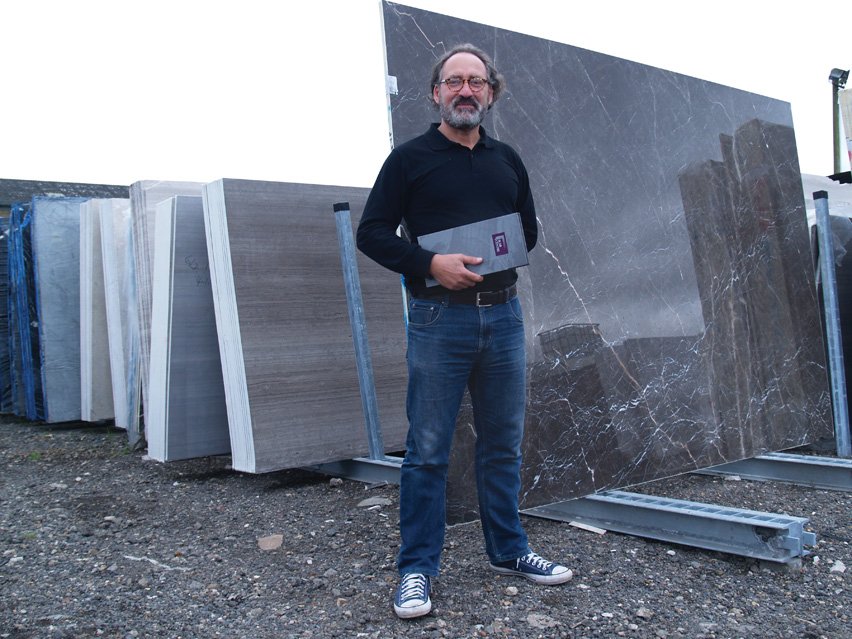Slab Centre: New wholesaler fights-back against direct suppliers from overseas
Carlos Zanarotti started Slab Centre after being let down by a stone wholesaler on a project where he was the specialist stone contractor. He thought he could do a better job and has set out to prove it with Slab Centre.
The business he launched at the Natural Stone Show in London in April aims to compete not with the UK’s existing wholesalers, but primarily with Italian suppliers now selling stone directly to projects in the UK.
At the Stone Show he met a developer who has asked him to quote for 1,000 slabs (4,500m2) of what Slab Centre calls New Calacatta (from China) for a riverside development in London. He is bidding against Italians but at a third of the price of the Italian Calacatta. Another enquiry was for 1,200m2 and has already led to an order for 700m2, all of which is pretty impressive for a start-up.
Slab Centre does not stock the wide range of stone typically found at a stone wholesaler. Instead, it stocks a larger number of slabs of a smaller selection – currently 20 kinds of stone. Carlos wants them to be specified for medium sized, top-end domestic and commercial projects and stocks them in sufficient quantity to supply that kind of project from stock.
 He is even happy to supply other UK wholesalers who do not hold as many slabs of any one particular material as Slab Centre does.
He is even happy to supply other UK wholesalers who do not hold as many slabs of any one particular material as Slab Centre does.
He will also recommend his fellow wholesalers to some of the people who contact him because he does not want to sell the odd one or two slabs to stone fabricators or consumers, nor to take orders for stone he does not have in stock.
Slab Centre does not stock granite slabs for worktops and the small fabricator working on individual kitchens and bathrooms would often be happy to go elsewhere because Slab Centre does not offer credit. In order to keep things simple Carlos pays for all his stock up-front and insists his customers do the same before it is loaded.
On the other hand, he does not expect people to pay until they have seen the stone because he does not want to get involved in returns. When you buy it, Carlos makes it clear it’s yours and he will not be taking it back.
“I have a container coming in next week. All the stone is allocated and the customer wanted to pay for it. But I told them I wouldn’t take their money until they had seen the slabs. They will like what they get but I don’t want any discussion about it further down the line.”
One of the reasons he is sure his customer will like the stone when it arrives is because Slab Centre has an agent working for it in China, inspecting every single slab to make sure only stone of a quality that is acceptable to the UK market is loaded, eliminating problems at source.
To help further reduce risks down the line, he is having the stone tested in order to provide the information fabricators should be using to CE Mark much of the stone they supply. CE marking does not apply to worktops or fireplaces, for example, but it does apply to floors and wall linings for showers and stone used for feature walls. There is no CE Mark standard for slabs, but companies that convert the slabs into floors and walls are legally obliged to supply the stone CE Marked, even though most don’t bother. There are, however, stone consultants who insist on using CE Marked stone on projects because they don’t want to face the consequences of not having done so if anything goes wrong.
Those consultants often work on just the sort of project Slab Centre wants to supply. Carlos says: “Supplying test data for CE Marking will be a bit of a trump card when it comes to projects.”
While Carlos does not plan to supply small domestic projects, he does not plan to supply the largest projects, either. Again, he is happy to pass those on to others, usually in Europe, who will pay him a small commission for the reference.
The limestone and marble he stocks is for floors and walls, especially (but not exclusively) for bathrooms and larger living areas. Most of the 20 different kinds of material he has in stock are from China, often offering a lower price alternative to already popular European stones such as Statuary and Calacatta, Portoro, Noir St Laurent and others. They are not always a precise match, but fit the same aesthetic for customers looking for that style of finish.
And it is all natural stone. There is no quartz, UCS, porcelain, glass or anything else… at the moment. Carlos suspects in the long term tastes might return to natural stone. On the other hand, he is not oblivious to the still rapid growth of man-made products that emulate marbles and limestones and has not ruled out the possibility of stocking them. His business is still embryonic and he is happy to let the DNA of the market determine precisely its final form. Some of the materials Slab Centre sells are half the price (or even less) of what might be considered their European equivalents. That can either make a project more competitive or more profitable for the developer and stone fabricator involved.
Not all the stone comes from China. There are slabs from Oman, Vietnam and even Italy. But Carlos says the Italian slabs he is selling are much the same price as the Italians are supplying them directly into the UK and less than anywhere else he has seen them on sale inside the M25.
His prices are low, he says, because he is buying the stones in bulk and has minimised his overheads. He is basically operating a one-man-band on land rented from a Green-Belt farmer in Harefield, Uxbridge, and keeping the business plan simple to reduce his exposure to risk.
He had originally intended to expand at Harefield by renting more land there. However, a neighbouring plot he had hoped to move on to is now temporarily occupied by a concrete company supplying the CrossRail project. Slab Centre has already been told its rent will double next year, so Carlos has had a re-think and now plans to extend a storage centre he has near Ipswich, close to Felixstowe, where the stone lands.
He will retain the site in Harefield as a reception and distribution centre conveniently positioned for London.
And while Slab Centre wants to get its stone specified for projects and is preparing sample packs of its stones to give to architects and developers, Carlos insists it will not supply sawn-to-size stone directly to projects. It will only sell to fabricators. It is all part of keeping the business model simple.
“Basically, I’m supplying value engineering options at unbeatable prices,” says Carlos.
As well as buying and selling stone himself, Carlos is also acting as an agent for two European quarry operators – Solancis, a big Portuguese company that has already supplied several major projects in the UK; and Pavestone, a Spanish company that owns 14 quarries in various parts of the world and supplies stone for hard landscaping.
Carlos has been in the stone industry for a long time – he ran his own businesses of Limestone Gallery before buying Stonell. Slab Centre is a trading name of Stonell. Carlos had intended to sell Stonell to his partner and put his feet up for a while. In the event, he ended up buying out his partner at the end of last year.
It is because Carlos is well known that Solancis and Pavestone approached him to represent them in the UK. Carlos says their businesses and his are different and will not tread on each other’s toes. “These are amazing companies and it didn’t take much convincing for me to be part of their team,” he says.
So far, Carlos has concentrated on setting up his business and stocking the right materials at the right price. That has not left him much time to work on a website, but he said when NSS visited Slab Centre last month (October) he hoped the website would be live before this issue of the magazine arrived on his customers’ desks. You can see for yourself whether or not he made it at www.slabcentre.com.

